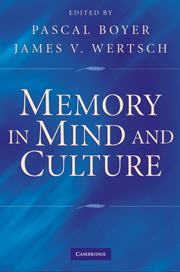Book contents
PART III - HOW DO WE BUILD SHARED COLLECTIVE MEMORIES?
Published online by Cambridge University Press: 05 June 2012
Summary
We all know that in many human groups people have created a particular version of their own collective past, represented by most members in roughly similar ways, and passed on from generation to generation. So far so good. But how does that occur?
Vague notions, especially when they seem profound and richly evocative, often stand in the way of precise empirical investigation. That is a common occurrence in the social and behavioral sciences, and nowhere is a warning against such seductive concepts more apposite than in the study of shared memories and the collective past. It is not clear in precisely what manner the notion of “collective memory” helps us make sense of how people create distinctive versions of their collective past and come to share these versions. The metaphor is not just unclear but also misleading, as James Wertsch points out (this volume). First, talking about memory rather than remembering obscures the fact that there are agents here, people who actively listen, select, modify, or rigidify particular versions of their past. Second, it also blurs the functions of such memories, which are not about the past but emphatically about present interests and conflicts. This marks the simplest contrast between scholarly history and collective remembering – the latter has an agenda rather than a method, particular goals but no explicit standards (Wertsch, 2002). The process of construction, as in the case of individual memories, is largely implicit.
- Type
- Chapter
- Information
- Memory in Mind and Culture , pp. 113 - 116Publisher: Cambridge University PressPrint publication year: 2009



